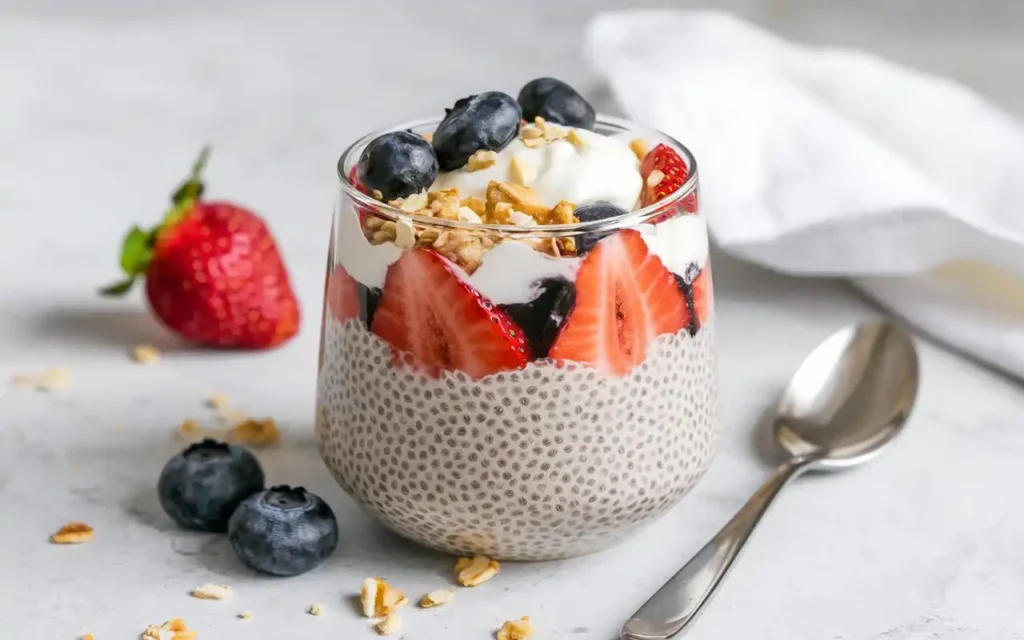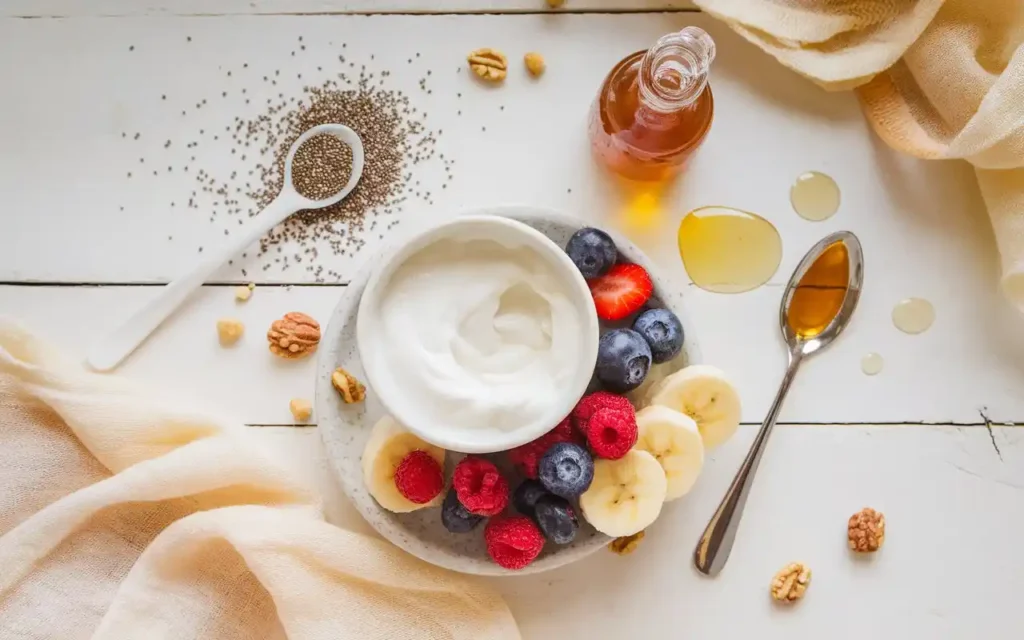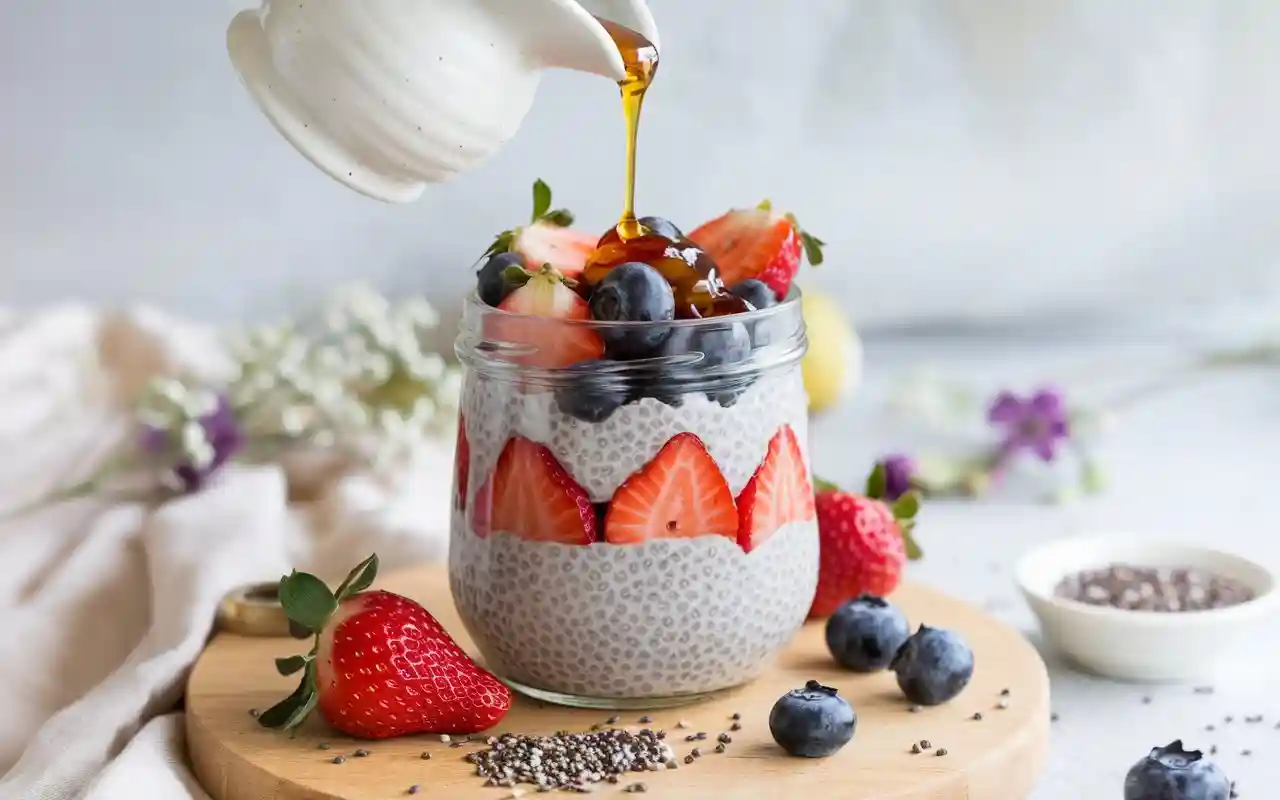Chia seeds and yogurt make for a powerful duo that can supercharge your diet with essential nutrients and health benefits. Discover how this simple combination can boost your well-being.
Introduction
Superfoods have taken the health and wellness world by storm in recent years, with chia seeds emerging as one of the most popular options. These tiny seeds pack a powerful nutritional punch, offering a range of health benefits. Yogurt, another well-known superfood, has long been praised for its probiotics and bone-strengthening nutrients. When combined, chia seeds and yogurt create a delicious and nutritious powerhouse that can significantly boost your overall health and well-being.
Chia seeds, originally native to Mexico and Guatemala, have been consumed for thousands of years. The ancient Aztecs and Mayans valued these seeds for their ability to provide sustainable energy. In fact, the word “chia” comes from the ancient Mayan language and means “strength”. Today, chia seeds are enjoyed worldwide and are easily incorporated into a variety of dishes, including yogurt.

Yogurt, on the other hand, has been a staple in many cultures for centuries. It is produced through the bacterial fermentation of milk, which results in a creamy, tangy, and nutrient-rich food. Yogurt is an excellent source of probiotics, which are beneficial bacteria that support digestive health and boost immunity.
When chia seeds are added to yogurt, the result is a creamy, nutritious, and satisfying snack or meal that offers a wide array of health benefits. This combination is not only delicious but also incredibly versatile, making it easy to incorporate into your daily diet.
In this comprehensive guide, we will explore the numerous benefits of combining chia seeds and yogurt. We will delve into the nutritional profiles of both ingredients, examine how they work together to promote optimal health, and provide practical tips and recipes to help you incorporate this superfood duo into your meals. By the end of this article, you will have a thorough understanding of why chia seeds and yogurt are a match made in heaven and how you can harness their power to improve your overall well-being.
Nutritional Benefits of Chia Seeds
Chia seeds may be small, but they are mighty when it comes to their nutritional content. These tiny seeds are packed with an impressive array of essential nutrients that can greatly benefit your health.
Rich in Omega-3 Fatty Acids
One of the most notable nutritional benefits of chia seeds is their high content of omega-3 fatty acids. Omega-3s are essential fatty acids that play a crucial role in brain function, heart health, and reducing inflammation throughout the body. In fact, chia seeds contain more omega-3s than salmon, gram for gram.
High in Fiber
Another remarkable aspect of chia seeds is their high fiber content. Just a single ounce (28 grams) of chia seeds contains 11 grams of fiber, which is approximately 42% of the recommended daily intake. Fiber is essential for maintaining healthy digestion, promoting regular bowel movements, and keeping you feeling full and satisfied.
Excellent Source of Protein
Despite their small size, chia seeds are an excellent source of plant-based protein. A single ounce of chia seeds contains about 4.7 grams of protein, which is impressive considering their low calorie count. The protein in chia seeds is complete, meaning it contains all nine essential amino acids that the body cannot produce on its own.
Packed with Antioxidants
In addition to their impressive macronutrient profile, chia seeds are also rich in antioxidants. The antioxidants found in chia seeds include chlorogenic acid, caffeic acid, quercetin, and kaempferol. These compounds have been shown to have anti-inflammatory, anti-cancer, and neuroprotective properties.
Health Benefits of Yogurt
Yogurt is another beloved food that offers a wide range of health benefits. Let’s explore some of the key advantages of incorporating yogurt into your diet.
Good Source of Probiotics
One of the most well-known benefits of yogurt is its probiotic content. Probiotics are live microorganisms that, when consumed in adequate amounts, can provide health benefits to the host. The most common probiotics found in yogurt are Lactobacillus bulgaricus and Streptococcus thermophilus, which help maintain a healthy balance of gut bacteria.
High in Calcium and Vitamin D
Yogurt is an excellent source of calcium and vitamin D, two nutrients that are essential for maintaining strong bones and teeth. A single 8-ounce serving of plain, low-fat yogurt contains about 42% of the recommended daily intake of calcium and 10% of the recommended daily intake of vitamin D.
May Improve Digestive Health
In addition to its probiotic content, yogurt may help improve digestive health in other ways. Many people who are lactose intolerant can tolerate yogurt better than other dairy products because the live cultures help break down lactose. Yogurt also contains compounds that may help protect against ulcers and colon cancer.
Potential Weight Management Aid
Some research suggests that regular consumption of yogurt may aid in weight management. The protein and calcium in yogurt can help increase satiety and reduce overall calorie intake. Additionally, some studies have found that the probiotics in yogurt may help regulate metabolism and reduce body fat.
Combining Chia Seeds and Yogurt
Now that we’ve explored the individual benefits of chia seeds and yogurt, let’s see what happens when these two superfoods join forces.
Enhanced Nutrient Absorption
One key benefit of combining chia seeds and yogurt is enhanced nutrient absorption. The fiber in chia seeds can slow digestion and improve nutrient uptake, while the probiotics in yogurt help break down the seeds to access their nutrients more easily. The healthy fats in chia also help the body absorb fat-soluble vitamins like vitamin D from the yogurt.
Improved Digestion and Gut Health
Chia seeds and yogurt are a powerful combo for digestive health. The fiber in chia seeds helps regulate bowel movements, while the probiotics in yogurt support a balanced gut microbiome. Together, they work synergistically to keep your digestive system running smoothly.
Increased Satiety and Weight Loss Potential
Both chia seeds and yogurt are great sources of protein and fiber, two nutrients that promote fullness and may reduce overall calorie intake. When chia seeds absorb liquid from yogurt, they expand in your stomach, increasing feelings of satiety. The calcium in yogurt may also support weight management.
Versatile and Easy to Incorporate
Perhaps the best part of chia seed yogurt is how simple it is to make. Just stir 1-2 tablespoons of chia seeds into your yogurt of choice, let it sit for a few minutes to thicken, then enjoy as is or add your favorite toppings. The mild, nutty flavor of chia seeds pairs well with all kinds of yogurt flavors and mix-ins, so you can customize it to your taste.
How to Make Chia Seed Yogurt
Ready to try this tasty superfood combination for yourself? Here’s a quick and easy recipe to get you started:

Ingredients
- 1 cup plain yogurt (regular or Greek-style)
- 1-2 tablespoons chia seeds
- 1/4 teaspoon vanilla extract (optional)
- Honey or other sweetener to taste (optional)
- Fresh fruit, granola, nuts, etc. for topping (optional)
Instructions
- In a bowl or jar, combine the yogurt, chia seeds, and vanilla extract (if using). Mix well.
- If using a sweetener, add it to taste and stir until fully incorporated.
- Let the mixture sit for at least 5-10 minutes, or cover and refrigerate overnight for best results. The chia seeds will absorb some of the liquid from the yogurt and expand, creating a thicker, pudding-like consistency.
- When ready to eat, give the chia yogurt a good stir. If it’s too thick, add a splash of milk or water to loosen it up.
- Transfer the chia yogurt to a serving bowl and add any desired toppings. Enjoy right away.
Creative Chia Seed Yogurt Recipes
Once you’ve mastered the basic chia seed yogurt, try these creative variations to mix things up:
Tropical Chia Yogurt Parfait
In a glass or jar, layer chia seed yogurt with diced mango, kiwi, and pineapple. Top with shredded coconut and a sprinkle of lime zest for a bright, tropical twist.
PB&J Chia Yogurt
Mix 1 tablespoon of natural peanut butter into your chia seed yogurt. Top with a dollop of your favorite jam and a sprinkle of crushed peanuts for a healthier take on the classic sandwich.
Matcha Chia Yogurt
Whisk 1/2 teaspoon of matcha green tea powder into your chia seed yogurt for an energizing, antioxidant-rich treat. Top with sliced almonds and a drizzle of honey.
Chocolate Chia Yogurt Mousse
For a healthy dessert option, mix 1 tablespoon of cocoa powder into your chia seed yogurt along with a touch of honey or maple syrup. Let it chill in the fridge for at least an hour to thicken, then top with fresh berries and a sprinkle of dark chocolate shavings.
Precautions and Potential Side Effects
While chia seeds and yogurt are generally safe for most people to consume, there are a few precautions to keep in mind:
Choking Hazard
If consumed dry, chia seeds can pose a choking hazard as they absorb liquid and expand rapidly. Always pre-soak chia seeds or mix them into liquid before eating, especially if you have difficulty swallowing.
Digestive Discomfort
The high fiber content of chia seeds may cause digestive issues like bloating, gas, or diarrhea in some people, especially when consumed in large amounts. Increase your intake gradually and drink plenty of water to minimize any discomfort.
Interactions with Medications
Chia seeds may interact with certain medications, particularly blood thinners or blood pressure medications. If you take any medications regularly, consult with your healthcare provider before adding chia seeds to your diet.
Moderation is Key
As with any food, it’s important to consume chia seeds and yogurt in moderation as part of a balanced diet. While they offer numerous health benefits, they should not be relied upon as a sole source of nutrition.
Frequently Asked Questions
Can You Put Chia Seeds in Yogurt?
Yes, adding chia seeds to yogurt is a great way to boost the nutritional value and texture of your snack or breakfast. Simply mix 1-2 tablespoons of chia seeds into your favorite yogurt and let it sit for a few minutes to thicken.
Is It Safe to Eat Dry Chia Seeds in Yogurt?
It’s generally best to pre-soak chia seeds or mix them into liquid before consuming, as dry chia seeds can pose a choking hazard. When mixed into yogurt, the seeds will naturally absorb moisture and expand, making them safer to eat.
What Should Not Be Eaten with Chia Seeds?
Chia seeds can be enjoyed with a wide variety of foods, but if you take any medications, it’s a good idea to check with your healthcare provider before adding chia to your diet. Chia seeds may interact with blood thinners, blood pressure medications, or diabetes medications.
Is Yogurt with Chia Seeds Good for Weight Loss?
While no single food can magically make you lose weight, both yogurt and chia seeds have properties that may support weight loss efforts. The protein and healthy fats in this combo can help keep you feeling full and satisfied, potentially leading to reduced calorie intake overall. That said, weight loss ultimately depends on creating a calorie deficit through a balanced diet and regular exercise.
Conclusion
In conclusion, a match made in nutritional heaven is formed by chia seeds and yogurt. An impressive array of vitamins, minerals, fiber, protein, and beneficial fatty acids that can support overall health and well-being is offered by both foods. A satisfying, nutrient-dense snack that can help keep you feeling your best is created when they are combined.
Whether chia seed yogurt is enjoyed on its own or used as a base for more creative recipes, more wholesome ingredients can be incorporated into your diet in an easy and delicious way with this simple combination. Just remember that moderation should be practiced in their consumption, your body’s signals should be listened to, and your doctor should be consulted if any concerns are had.
So why not let chia seed yogurt be given a try to see how you feel? You will be thanked by both your taste buds and your body.
